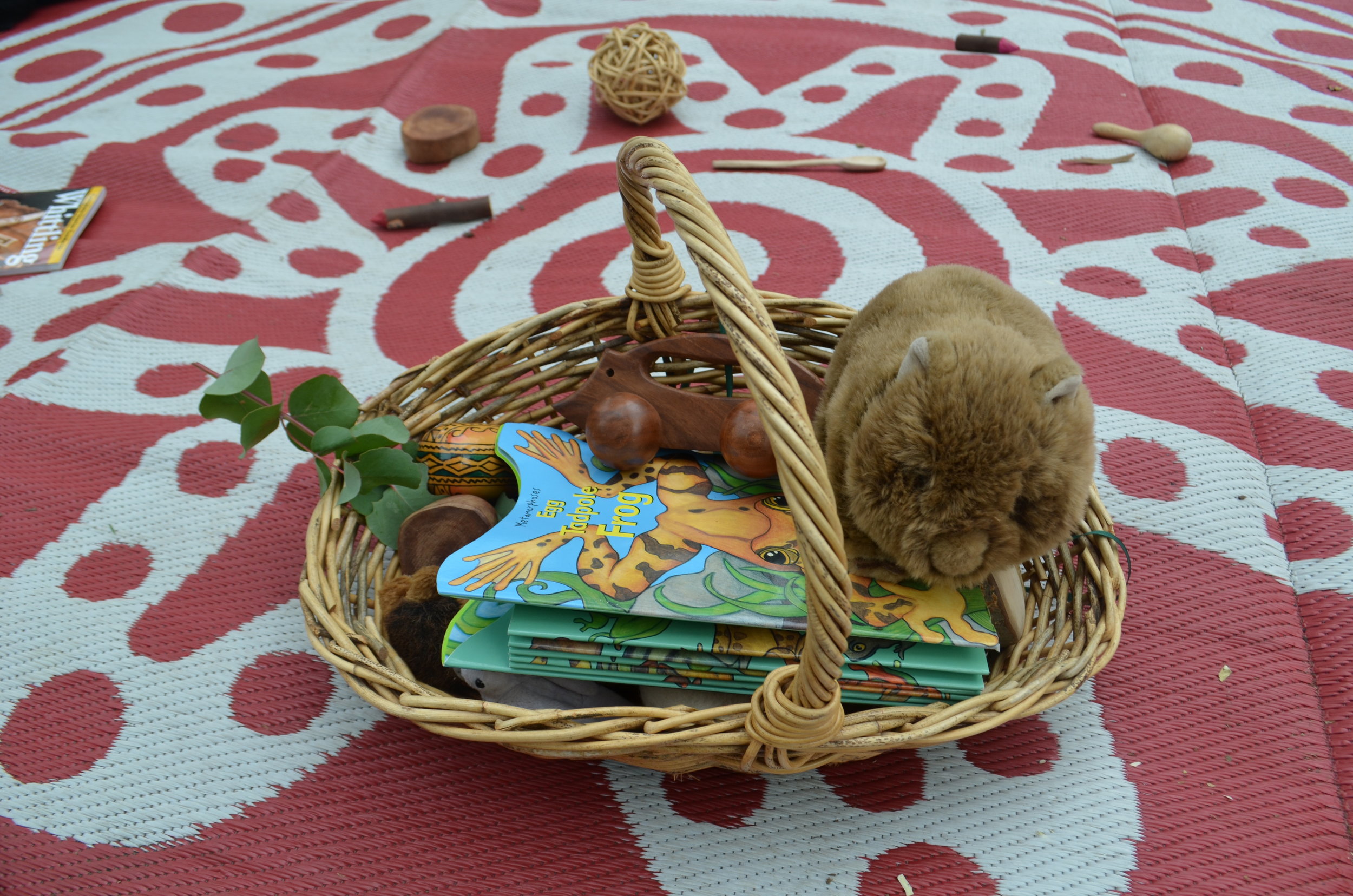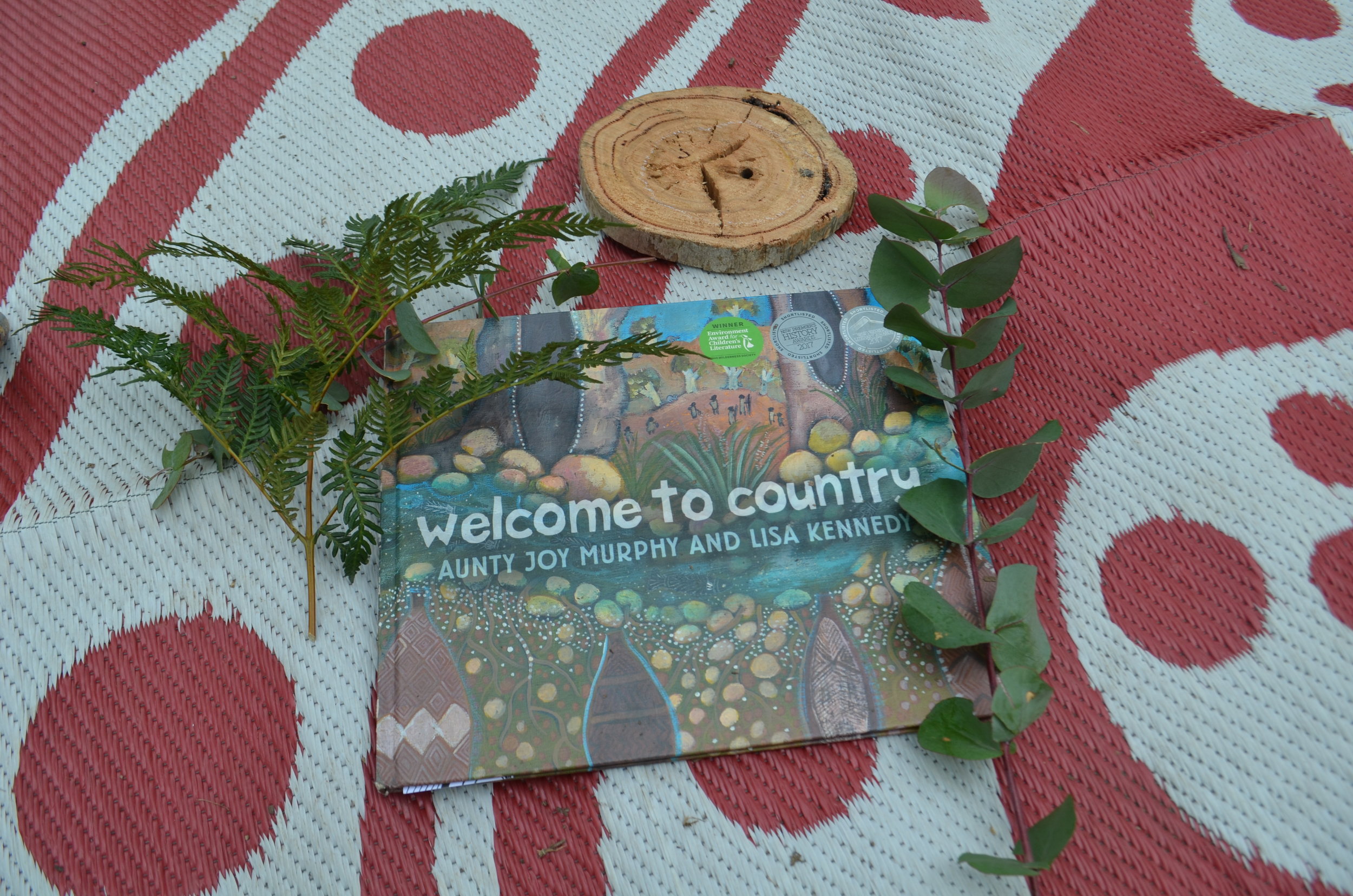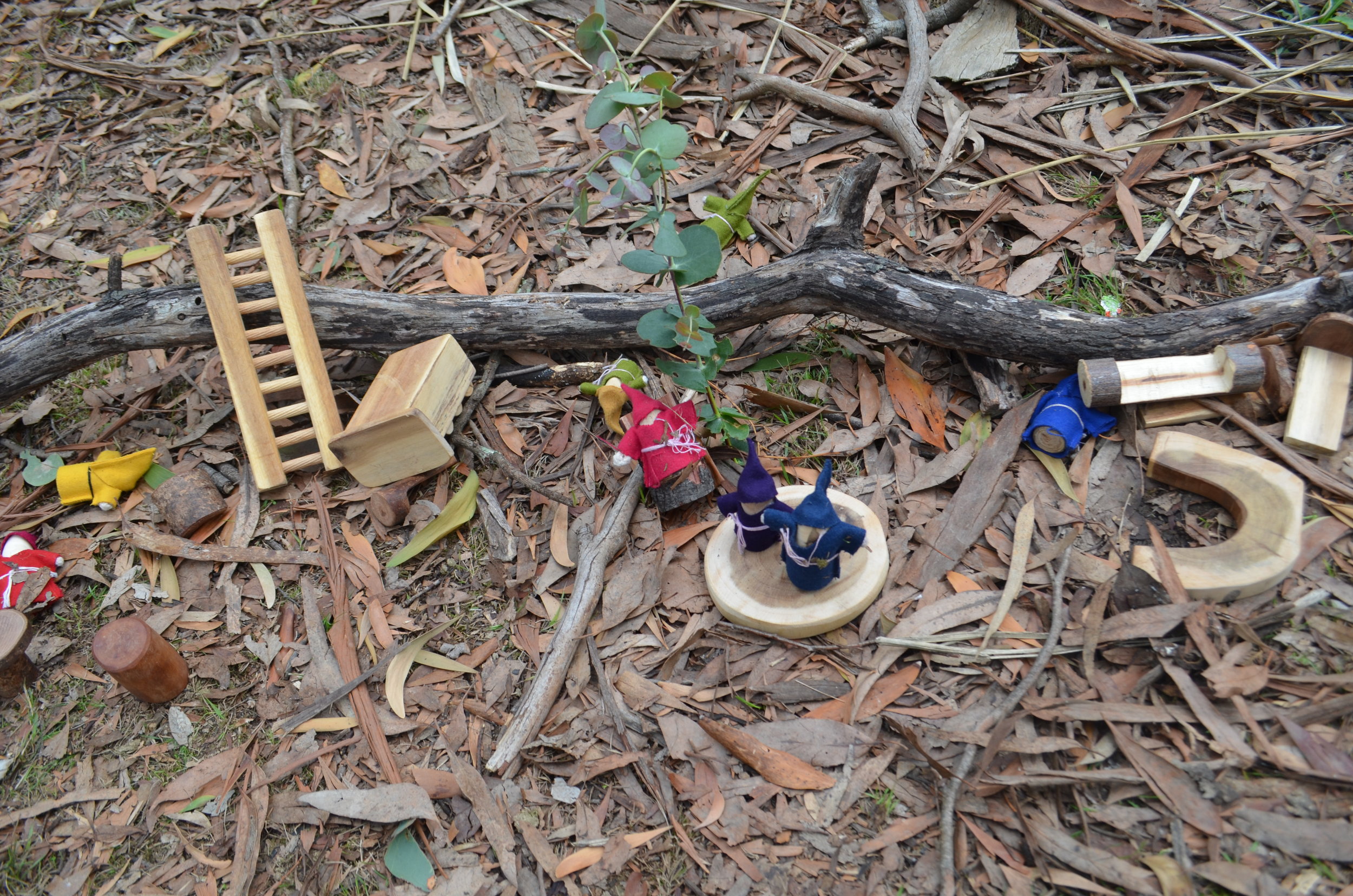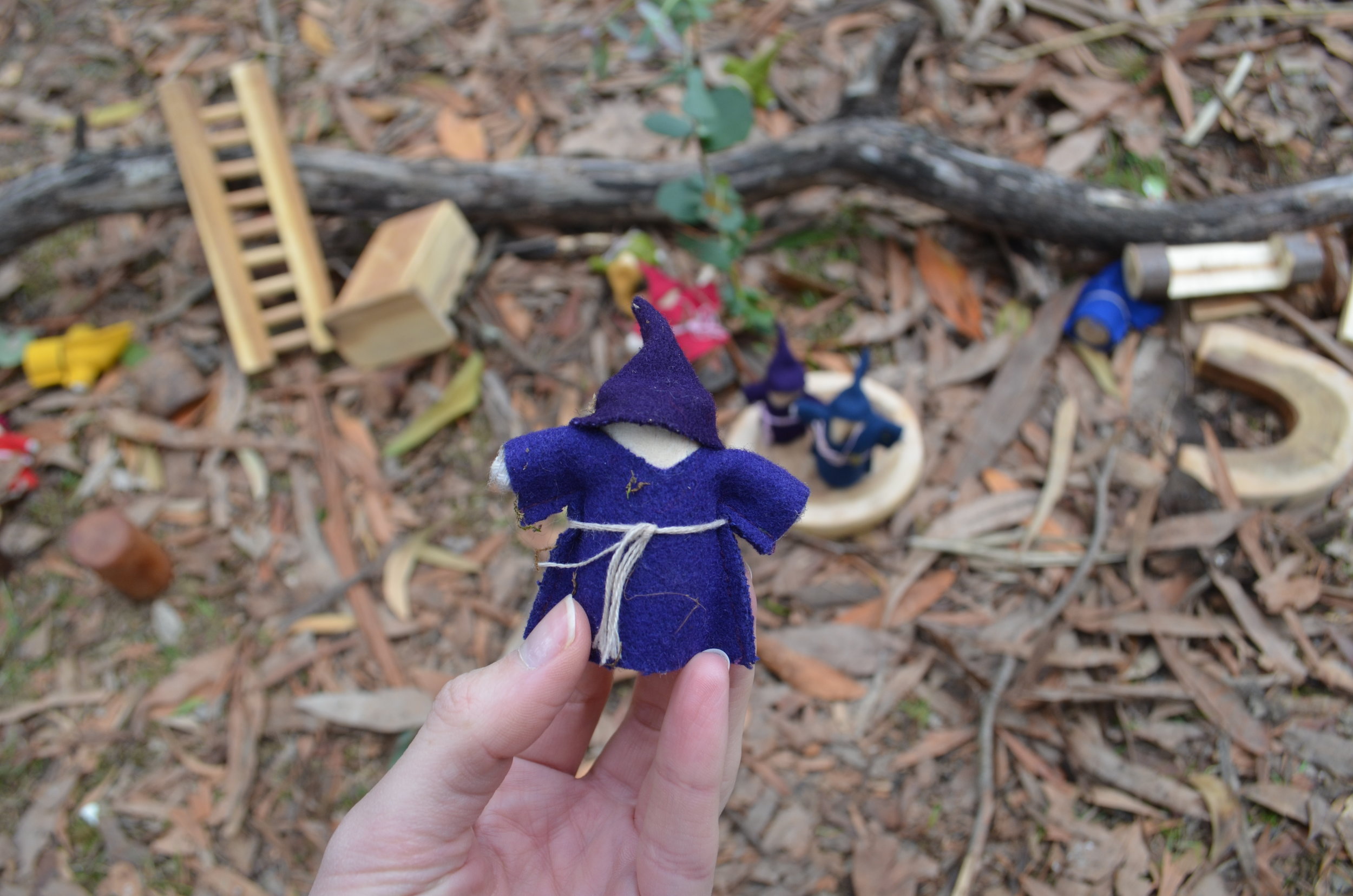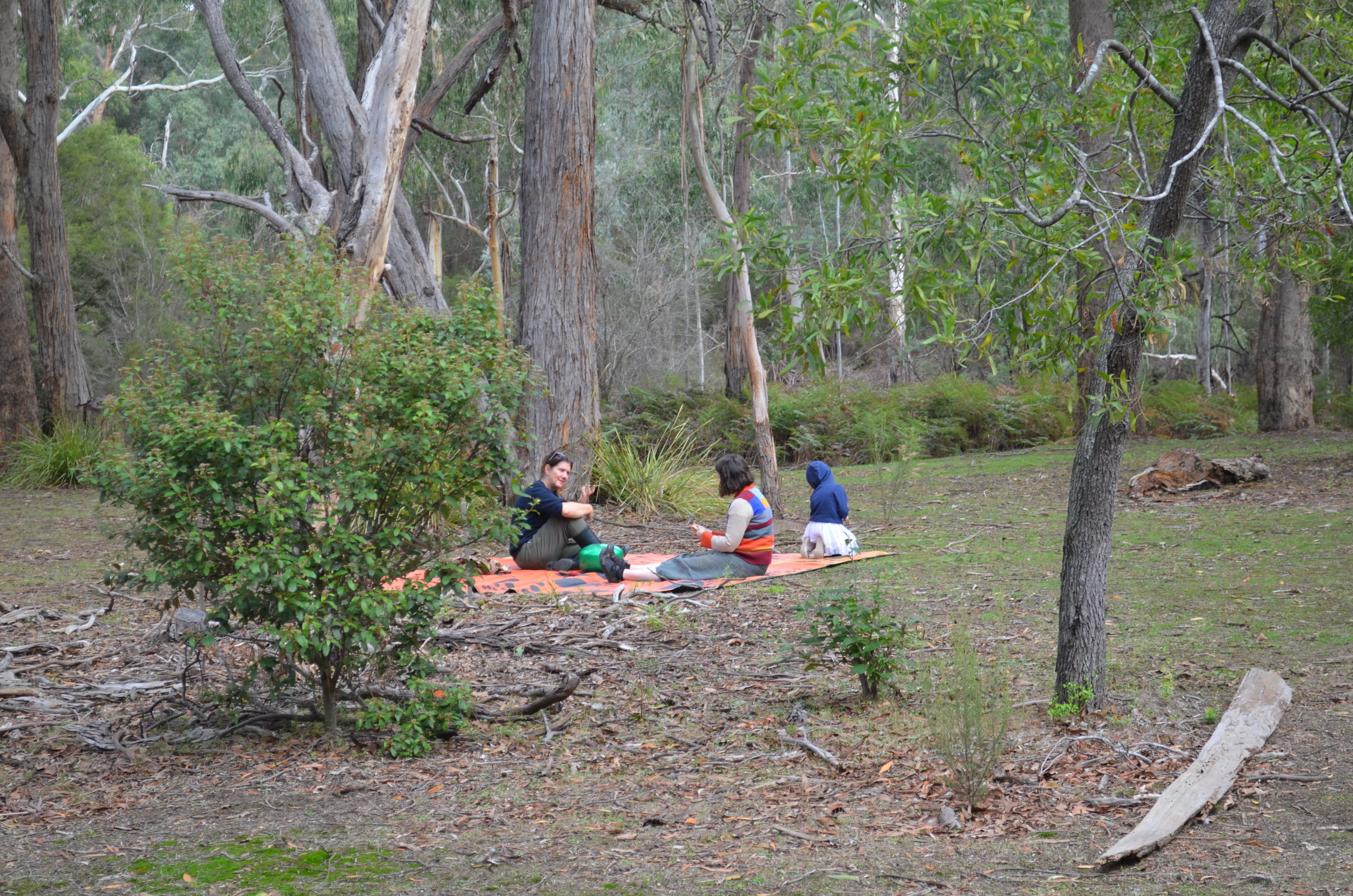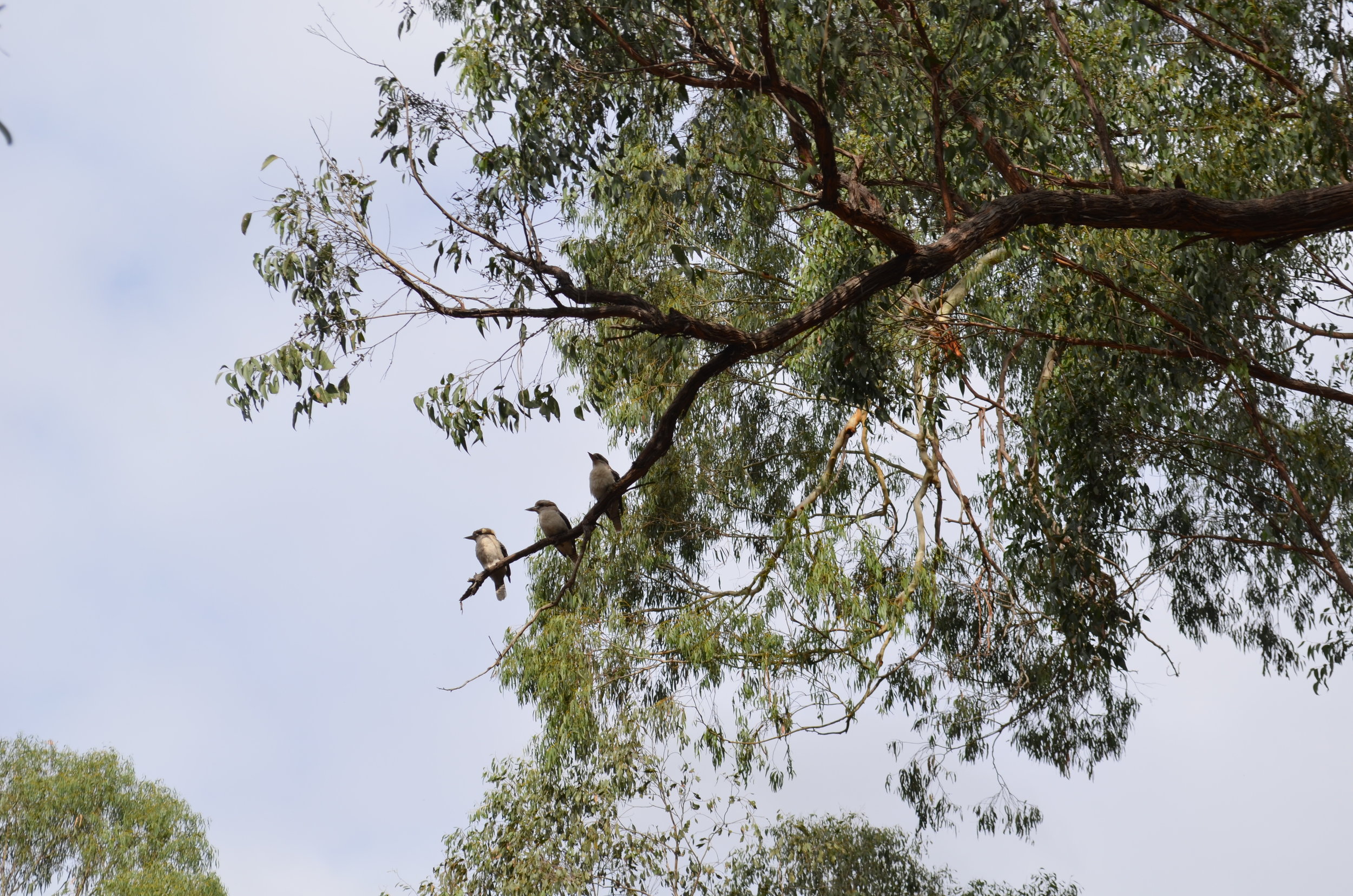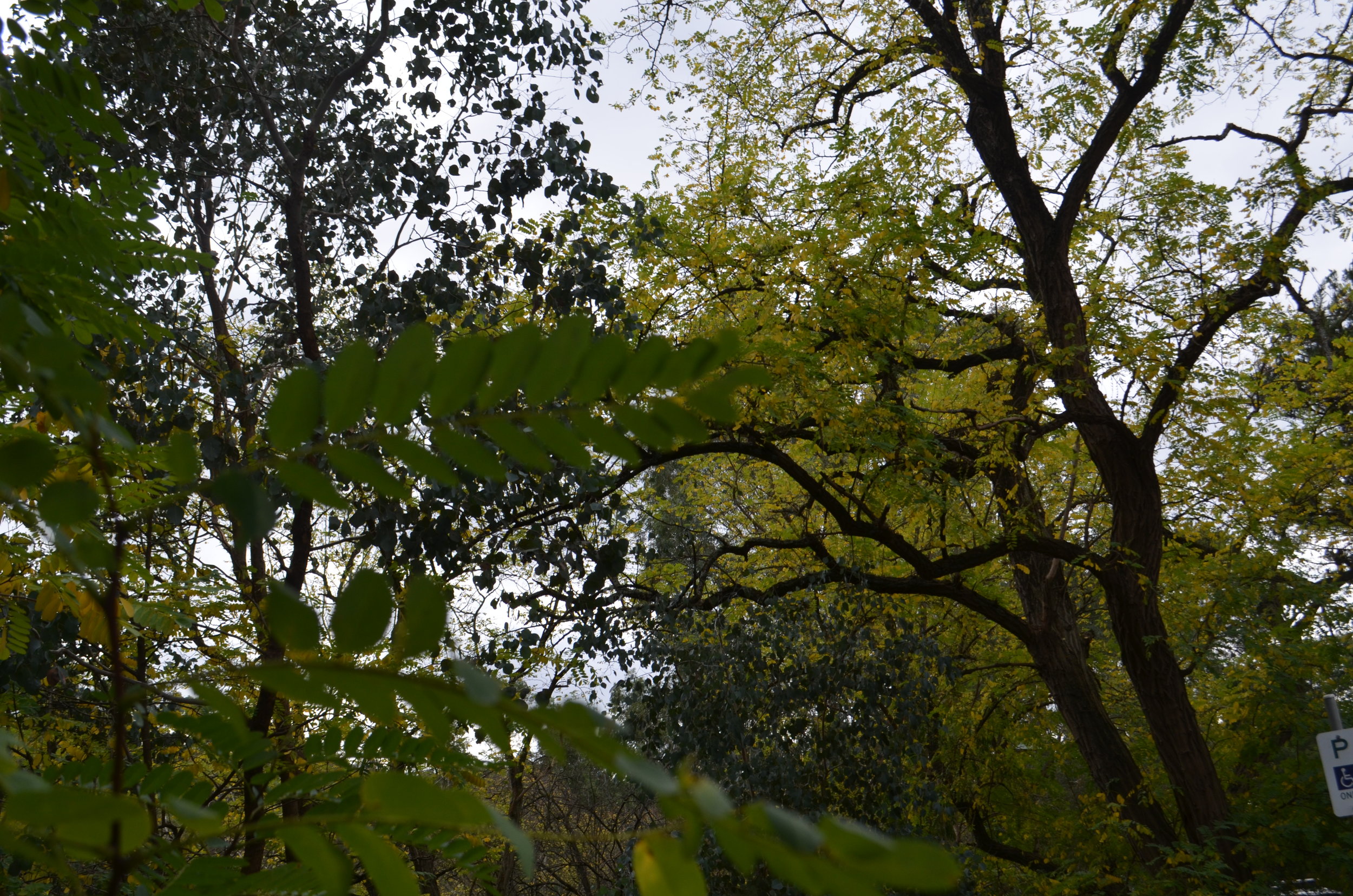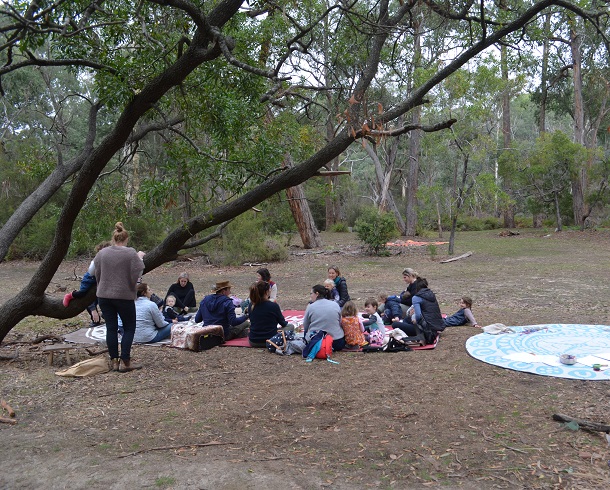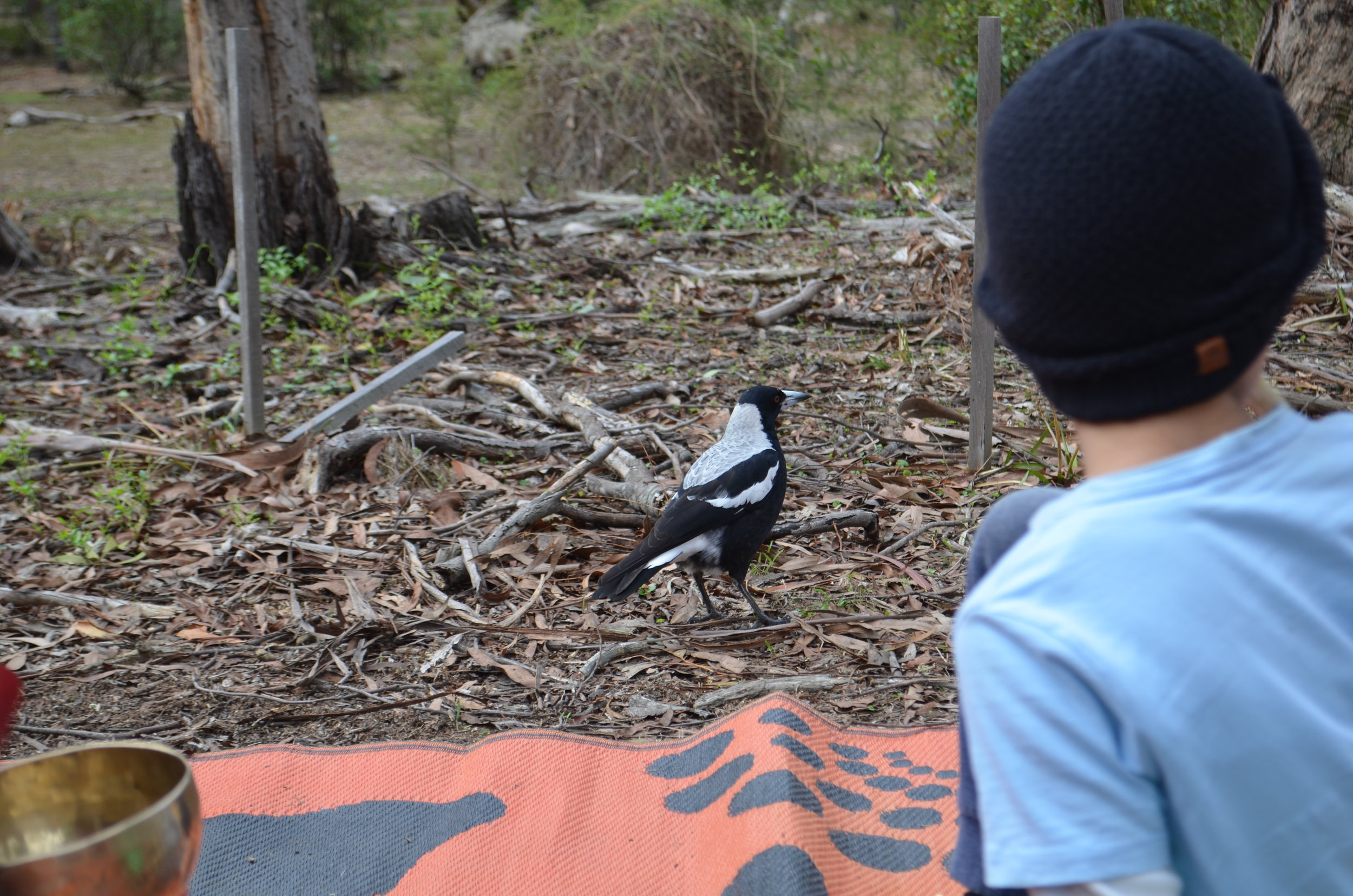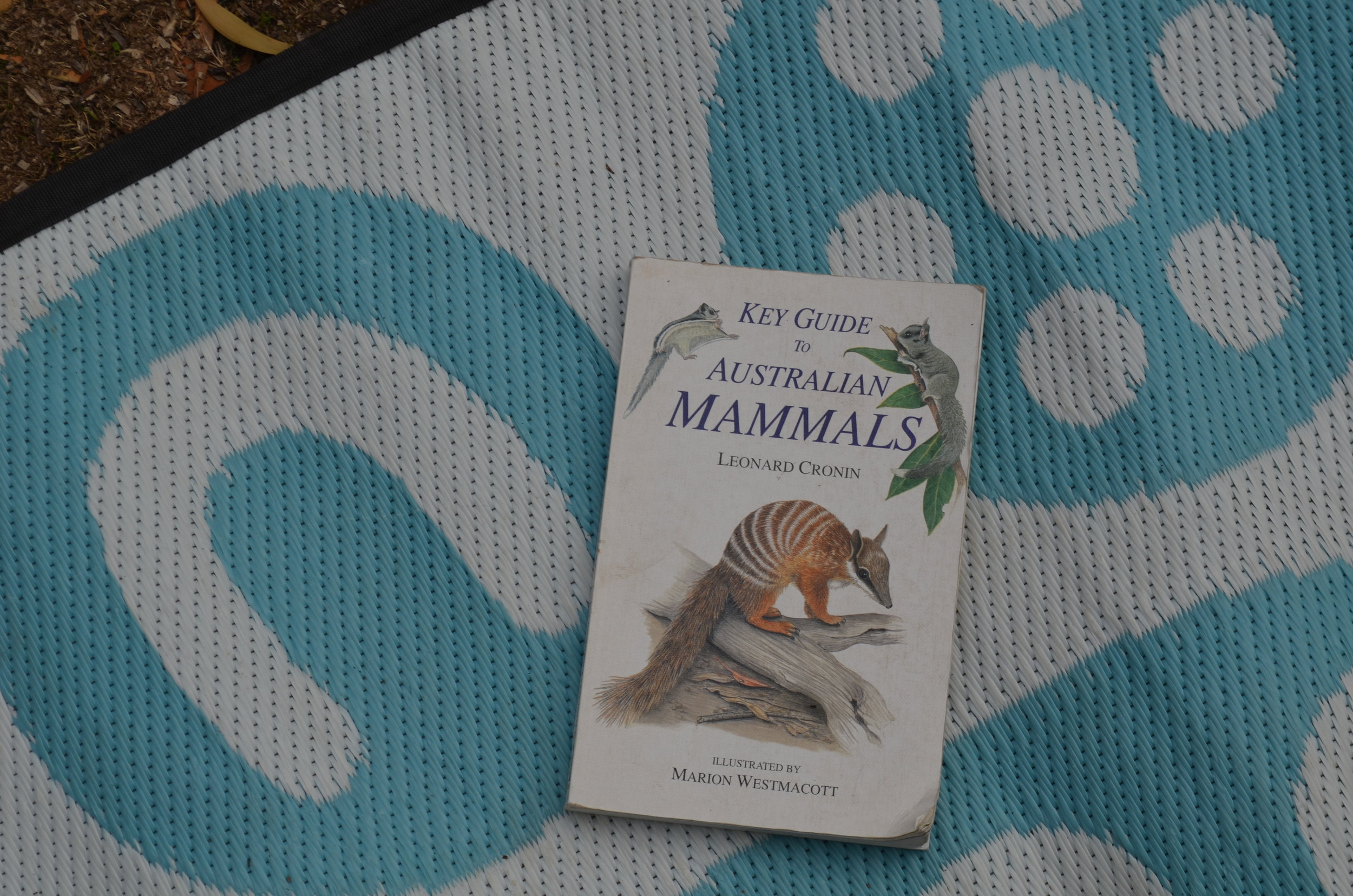Eco Explorers
Bush Playgroup
Within a few seconds of entering Warrandyte State Park, three almighty kangaroos appear to the left of the dirt track. Cautiously they watch through the spindly branches. Their thick tails rest steadily on the forest floor, littered with gum leaves. The leader of the pack watches warily, curiously. The youngster hangs behind. A few moments pass of considered looking and listening and then they spring up and bounce off through the trees until out of sight. This encounter was full of awe and wonder. If anyone was feeling sleepy this morning, they are now awake, marveling at the beauty of this incredible landscape and the animals that call it home. What an inspiring place for a playgroup.
“This morning I opened my car door and all you could hear was everyone so happy, it’s so beautiful. I love that,” said one Mother shortly after arrival at Forest playgroup.
“It is so good for the families, for their wellbeing and mental health. It’s fundamental in this day and age,” said Facilitator Hayley, a certified mindfulness coach while looking around at the families chatting and playing among the bushland that runs along the Yarra River.
“It’s kids being kids. Not being adults, or not necessarily doing what we perceive they should be doing. It is them investigating and learning at their own pace.”
“We can learn so much from just watching them. And it’s not just about kids but families and family units together and the parents who come and can just slow down and just be, just get into their senses as well and be present moment.”
That is one key observation throughout the morning, everyone is present. Nobody has any devices in their hands. The kids are consumed in play and the parents are too, bobbing in and out of it to look around at the wildlife and to chat with one another.
Forest School Leader and playgroup facilitator Adam is the custodian of this particular group and he beams watching from a distance.
Adam is leading the Forest School movement out here with Melinda, his partner. They are helping to facilitate the Forest School training from the UK to come to Australia and deliver the training to educators in Victoria, something that has been part of the UK curriculum for over 20 years now.
Eco Explorers run playgroups and forest kindy sessions across Melbourne as far as the Peninsula and even Phillip Island. They have a team of highly skilled, qualified and experienced playgroup facilitators, forest school leaders, early childhood educators, teachers, environmental scientists and artists who run a unique program that supports hands on learning, unstructured play and optimal early childhood development. This includes supporting the child’s physical, social and emotional well-being with a focus on building confidence, coordination, resilience and mindfulness.
“Children need to be moving. They need exercise and sensory stimuli to develop those healthy and essential brain pathways and they need to take risks. By taking risks children learn about themselves, their bodies and develop resilience, perseverance and confidence,” said Melinda Bito, founder and Managing Director of Eco Explorers.
Part of this type of learning is instinctive, being outside, in the changing seasons, in the changing elements, the senses open and are alert. It is a great stimulant for the brain in the early years of life as it constantly builds neurons and knowledge and practical skills. Another part of this learning is carefully planned and considered. Long before families arrive, Adam is setting up play areas, each with a different purpose and each teaching the art of bush craft.
“I spent such a big part of my childhood in the bush and the better part of my adult life trying to get back to it as often as I can,” said Adam as he lays out a tiny little world he has handmade out of wood and textile material. Upon a tree log he places a world of imagination. There is a bed, a ladder, little people.
“It is so exciting to be at the forefront of all of this movement. Many parents are starting to realise the importance of outdoor play and are wanting this type of program for their child not only for the early years abut also later.”
“Out here they are climbing logs, jumping in puddles, getting dirty and muddy. They are getting all of those networks firing.”
Adam is now living up in Kinglake with his family on 45 acres with deer, kangaroos, echidnas and wild goats that come down onto their property.
“My children are now being given the gift that I was given and you can feel it.”
There are rich stories and connections forging between the families throughout the term and these connections are so important for building communities. As the phrase goes, “it takes a village to raise a child.” Eco Explorers is connecting locals and building communities that care about the environment.
Words fall and birdsong fills the air.
The power of nature and human spirit soars out here. The kids are getting that, absorbing particles, as it gently falls around them.
“At the start of the term we actively encourage the parents and tell them, this is your time with your children in nature. We encourage you to disconnect from your busy lives, take that two hours out. Half the time the craft activities they are doing, the parents end up doing- they leave in a completely different state.”
“There are a lot of dads and grandfathers who do come along. They love it!”
“I have one and I say how are you? And he says, ‘Ahhh, better now.’”
“They get given that space, just to stop.”
Kookaburras flap down and hang on the low lying branches. Throughout the morning, the songbirds provide a backing soundtrack.
There is a lot going on here, slowly and surely; below the soil and within the trees. Throughout the term, the children and families are observing the change.
“Being child-lead, it allows children to come in and gently and connect with the space and find their way around. You will see what happens, a natural progression to the mat in about half an hour, and then they may want food and we will start a little song, a little welcome which will lead into a weekly theme, an activity around that and then we will go on a bush walk and then come back to the mat for a song.”
This week the children are whittling wood. Here the forest school training that Adam has mastered comes into play. Half of the group wanders off for a nature meditation with Hayley while he teaches a handful of families about the wood, where it has come from, the colours, the scent. Then he shows them how to carefully peal the outside, with a glove on one hand, and a peeler in the other. This is a wonderful exercise as the parents are fully part of it and it is getting their brains working too as they concentrate at the task at hand.
“Small achievable tasks or else we get frustration,” said Adam as he helps one little girl get the hang of the peeling.
Across the way Hayley begins the meditation. Soft voices and faint sounds join the birds tweeting through the trees. This exercise brings the excitement levels down and the children become completely absorbed in the ringing of the drum. The each have a turn. Hayley has a calming presence. She asks the children to close their eyes and share what they hear.
It is relatively serene at Pound Bend Reserve and the families listen closely. Magpies warble and encourage visitors to tune in and to look around. The birds are not shy and as the music class continues, they come and wander across the mat.
John, a grandfather, enjoys coming along.
“I have learnt lots, it’s been great.”-
“The park is so interesting with the birds, the animals. There was a kangaroo just as we were coming in.”
“I don’t get any of ‘I’m not going’ or that type of stuff.”
“Trying to get him outside at home is actually quite difficult whereas when we come here he loves to be outside.”
John’s grandson is very captivated by the sap on the trees. He will always want to go and see if there is some sap, trying its stickiness. At first he wants to wash his hands, but then carries on happily.
“He is really learning about the systems.”
“We are learning a lot about the bush. It is just a lovely, free atmosphere for the kids.”
“I just enjoy being in the outdoors, it’s fantastic and then to be learning bush craft from Adam is what he is really teaching the kids is bush craft which is really helpful for living in Australia and there is a tie to the indigenous people, we always thank them for the land and it always will be.”
Adam has seen firsthand the impact this type of learning has had on his own son. When he first went off to kinder, it didn’t work so Adam and his wife decided to take him out.
“In the bush he is just a different child.”
“He spent nearly a year going to Forest School and he has now started school this year. He has built up his resilience and self-esteem. What he gained from the program, was a stepping tool to go into an education system, which I never thought I would see the day.”
People continue to return.
“When you are here, it feels a lot more open,” said one mother watching her son play with a friend. A friendship forged and strengthened over the weeks.
“Since coming here, he has become a lot better at listening and sharing. He is climbing and gross motor skills have improved, definitely.”
“My kids are super lucky,” she smiles.
Hayley echoes the sentiment.
“I love it. My kids are very much raised in nature and go on adventures. We are spoilt out here, really.”
“It’s all so rushed.”
“I am a big promoter advocate for emotional well-being.”
This program continues to grow as the positive wave rolls on. It is lots of fun and brings everyone together. The positive impact on parents living in the busy world is profound as they crave time to slow down and to play with their children.
“It is so rewarding,” said Adam
“For children that have never done anything like this before. They leave with this sparkle in their eye or seed that has been planted”.
It is a glorious thing that seems to bring us back, to rejoin the environment, that which feeds us, waters us and gives us light.
“I think we have got to come full circle,” said Adam.
“It is going to take time but everyone is realizing the impacts of the way we have been living, it’s not working. I heard a study about a man who was driving to work in the city on a bus or a tram and just driving past a park everyday, just seeing that park and those trees, studies show how that was helping him, just that glimpse of nature.”
Here, nature is all around and what a splendid place it is to be.
Article by Sinead Halliday



